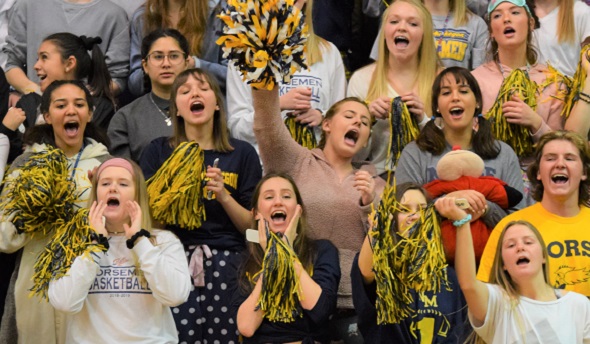
Redefining Winning (and Losing)
March 9, 2018
There’s been much media attention given to a boys basketball game in another state that turned into a brawl led by adult fans and resulted in suspension of both schools’ seasons and dismissal of both schools’ teams from the state basketball tournament.
From a thousand miles away, I can’t comment on who’s at fault or whether the penalty fits the crime. However, I shout a hearty “Amen!” to what that state’s high school association executive director had to say, according to one of the state’s major newspapers.
“We have too many people putting too much emphasis on winning, or on the wrong definition of winning. Their definition of winning is on the scoreboard only. It’s become a very big problem, and it’s not the (state association’s) definition of winning.”
He continued, “Sportsmanship has been eroded. We’re supposed to be teaching ethics, integrity and character to these kids ...”
Spot on!
The biggest challenge we face in school sports administration across the country is communicating amidst the clutter of contradictory messages that the definition of winning – the meaning of success – is very different in student-centered, school-sponsored competitive athletics than in most other popular brands of sports.
This is educational athletics. It’s about learning far, far more than about winning, which is an important goal but nowhere near the highest objective in interscholastic athletics.
If we lose this perspective, all is lost.

BOTF IX: Can You Cheer with the Champs?
By
Geoff Kimmerly
MHSAA.com senior editor
December 10, 2019
Six schools have won at least one Battle of the Fans championship since the contest was created during the 2011-12 school year.
This year, it could be your school's turn to show it has the top high school cheering section in Michigan.
The MHSAA's Student Advisory Council is calling all contenders to take part in Battle of the Fans IX.
North Muskegon was named last year’s champion and presented with a banner during the MHSAA Boys Basketball Finals at Michigan State University’s Breslin Center. Sections from Buchanan and Saginaw Heritage also were finalists, with Ann Arbor Father Gabriel Richard, Carson City-Crystal, Petersburg-Summerfield, Petoskey, Traverse City West and Wayland’s sections also making the semifinals.
Schools are invited to submit a short video, via YouTube, of their cheering sections in action at a school sporting event. Video submissions should be between 90 seconds and three minutes long and explain how that section meets the following contest criteria: positive sportsmanship, student body participation, school spirit, originality of cheers, organization of the group, student section leadership and fun.
The deadline for student-submitted video applications is noon Jan. 11. Nine semifinalists then will be chosen – three each from Class A, Class B and Class C/D – to partake in a two-week challenge where each will be required to complete 10 tasks further showing why it should be chosen as Michigan’s best student section. From those nine, three finalists then will be selected by the Student Advisory Council and visited on a home game night by MHSAA staff and Advisory Council representatives. The MHSAA will produce a video of that finalist after each visit, with the champion being selected by the Student Advisory Council based in part on support each section receives on the MHSAA’s social media sites.
This year’s Battle of the Fans IX winner will be announced Feb. 21 and recognized March 27 at the Breslin Center.
“Nearly a decade after our Student Advisory Council developed this first-of-its-kind contest, Battle of the Fans is still going strong —not only as a way to award supreme sportsmanship, but also as an engine to drive school spirit,” said Andy Frushour, MHSAA director of brand management and advisor to the Student Advisory Council. “Over the first eight years, we have had plenty of winners that started as small, unorganized and negative student sections. But with enough planning and assistance from administration – and over just three short months – those sections turned into loud, crazy, fun places to be on game nights. We hope that happens with schools again this winter.”
Rules, directions for submitting videos, plus links to coverage of finalists from the first eight years of the contest can be found on the MHSAA Website. This year’s finalist videos, plus the announcement of the 2019-20 winner, will be published on Second Half.
The Student Advisory Council is made up of eight seniors and eight juniors who each serve two-year terms. The Council acts as the voice of Michigan's student-athletes; it serves as a student sounding board for the MHSAA's Representative Council, assists in planning Sportsmanship Summits, Captains Clinics and other student leadership events; participates in a yearly focus group about the state of high school sports for Michigan State University's Institute for the Study of Youth Sports and assists with medal ceremonies at MHSAA championship events.
PHOTO: Traverse City West shined plenty of bright lights when we visited as part of the 2017 BOTF finalists tour. VIDEOS: Below, check out the videos from our visits to all of the first eight BOTF champions.

